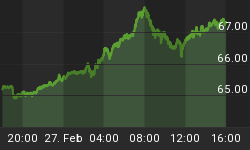We seem to have missed the celebration. Forget Christmas. Forget New Year's Eve. 23 December was the big day, and we should have all been partying. What should we have been celebrating on that day? On 23 December 1913 the Federal Reserve Act was passed by the U.S. Senate, creating the most monumental mistake of governance in 97 years.
One would think that if something has not worked effectively in 97 years that it would be thrown out. If your car did not work for 97 days, what would you do with it? Only governments would persist in maintaining an ineffective function in light of unending evidence of failure. We need to mark our calendars for next 23 December to celebrate the creation of the only government agency dedicated to making Gold more valuable. Federal Reserve has accomplished little else.
Original intent of creating a U.S. central bank was to have a lender of last resort in order to help avoid the financial panics that had ravaged the U.S. economy on a regular basis. Obviously, that was not to happen. Certainly, the two financial bubbles of the past decade demonstrate that the Federal Reserve, as currently structured, has no intention of reducing financial risk. Current policy of monetizing outright the Obama Deficit would seem to only further increase financial risk.
Per Wikipedia.org, not all in the U.S. Senate were enthusiastic on idea of creating the Federal Reserve. Only 43 of 95 Senators voted to pass the act. 25 voted against it and 27 did not vote. By a minority act of the Senate, the U.S. currency was to begin a near century of debasement. That is reason enough to view $Gold as having a long-term role in investment portfolios.
We do note, however, that the U.S. Senate has recently acted more responsibly on the matter of the Federal Reserve. It recently rejected for the second time the nomination of Peter Diamond, a winner of the phony Nobel prize in economics, to the board of the Federal Reserve. Perhaps some hope remains. However, until hope is converted into responsible monetary policy, we must retain our long-term interest in Gold.

Inflationary bias of U.S. Federal Reserve policy is now beginning again to appear in the chart above. That red line is the inflationary component of U.S. monetary growth. It has again turned positive, and is a reason for retaining Gold in one's portfolio. That inflationary bias will continue as long as the failed policies of intellectually inbred Keynesian economists are allowed to run amok at the Federal Reserve.
That all said, we must also live within a series of short-term time frames. Long-term is made up by a succession of short-term periods. In those short-term periods any asset, even one such as Gold, can become the subject of excessive speculation. That may be due to the irresponsible monetary policy of the Federal Reserve creating a bubble in precious metals.
2010 in China was the year of the tiger. In the West, 2010 was the year of the instant Gold guru. Two years ago most journalists and media heads did not know a Gold bar from a cucumber. Now, every article or commentator expounds on the obvious wisdom of having Gold and Silver in a portfolio. Ten years ago we jokingly talked of selling Gold when it became the central discussion at cocktail parties as was done with internet and technology stocks. Does anyone not talk about Gold and Silver?

Speculative bubbles, perhaps of a short-term nature, are clearly evident in Gold and Silver. However, despite the absolute price moves, the momentum of $Gold has weakened materially. Second derivative is negative. These conditions can be observed in the above chart.
Changes in momentum and relative strength proceed changes in absolute price. Again, the derivatives are dominant. As can be observed in the chart, the deeply negative momentum of the 1999+ era was converted into positive momentum and a bottoming in prices.
More recently, the upside momentum has reached extremes on three occasions. Each previous move to extremely positive momentum has been corrected by a return to near or below the zero return line. Given the current extremely excessive level of speculation in Gold and especially in Silver, little reason exists as to why it should not do so again. Longer term investors should continue to retain their Gold holdings as insurance against Keynesian economists. New cash should not be committed to either Gold or Silver until that zero return line is again achieved.
With 2011 now here, we have one final question today with which to close. Is this the second or third year in which hyperinflation is imminent?
GOLD THOUGHTS come from Ned W. Schmidt,CFA,CEBS as part of a joyous mission that has saved a multitude of investors from the financial abyss of paper assets. He is publisher of The Value View Gold Report, monthly, and Trading Thoughts, about weekly. To receive these reports, go to: www.valueviewgoldreport.com















